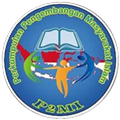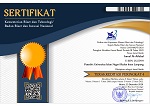PENDIDIKAN KARAKTER DALAM MASYARAKAT BUGIS
Abstract
Keywords: Konsep Sirri, 3S, Masayarakat Bugis
Full Text:
PDFReferences
A. Rahman Rahim, Nilai-nilai Utama Kebudayan Bugis, Cet. III; Ujung Pandang: Hasanuddin Press, 1992.
Abu Hamid, dkk., Siri & Pesse’- Harga Diri Manusia Bugis, Makassar, Mandar, Toraja, Cet. II; Makassar: Pustaka Refleksi, 2005
AhmadAmber dan Komin: Studi Perubahan Ekonomi di Papu, Yogyakarta: Bigraf Publishing, Yayasan Adhikarya IKAPI, dan Ford Foundation, 2005
Amiruddin,dkk, Kalosara di Kalangan Masyarakat Tolaki di Sulawesi Tenggara, MUDRA Jurnal Seni Budaya.
Arifin, Ilmu Pendidikan Islam, Jakarta: Bumi Aksara, 1991
B. F. Matthes, “Over de Ada’s of Gewoonten der Makassaren en Boegineezen”, Newyork: Doubleday Company Inc. 1969.
Brown, G. dan Yule, Discourse Analysis,(Cambridge: Cambridge University Press, 1983
Christian Pelras, “Budaya Bugis: Sebuah Tradisi Modernitas” dalam Tapak-tapak Waktu Kebudayaan, Sejarah, dan Kebudayaan Sosial di Sulawesi Selatan, peny. Kathryn Robinson dan Mukhlis Paeni, Makassar: ININNAWA, 2005
Christian Peltras, Manusia Bugis, Jakarta: Nalar , 2006
ChristianPelras, Manusia Bugis, Jakarta: Nalar kerjasama Forum Jakarta-Paris, EFEO, 2006.
D. H. Hymes, Foundation in Sociolinguistics: An Ethnographic
Approach, Philadelphia: University ofPennsylvania Press, 1974.
E. Mulyasa, Manajemen Pendidikan Karakter, Cet. I; Jakarta:
Bumi Aksara, 2011.
Fitri Kusumayanti, “Penggunaan Bahasa Ugi Sebagai Media Komunikasi dalam Interaksi Sosial pada Kelompok Etnis Bugis di Desa Punggur Kecil Sungai Kakap Kabupaten Pontianak”, Tesis Pontianak: Universitas Tanjungpura Pontianak, 2007
G. Eelen, A Critique of Politeness Theories, Menchester: St.Jerome, 2001.
Gede Raka dan Yoyo Mulyana, dkk, Pendidikan karakter di Sekolah, Jakarta: Gramedia, 2011.
Geoffery NLeech, Principleof Pragmatic, New York.: Longman, 1983.
Heri Gunawan, Pendidikan Karakter dan Konsep Implementasi, Cet II; Bandung; Alfabeta, 2012
Heri Gunawan, Pendidikan Karakter Konsep dan Implementasi, Cet II; Bandung: Alfabeta, 2012
Israpil, Silariang Dalam Perspektif Budaya Siri’ Pada Suku Makassar, Jurnal Pusaka, Januari-Juni 2015
J. L. Austin, How to do Things with Words, Cambridge, Mass: Harvard University Press, 1962.
J.Searle, Speech Acts: An Essay in the Philosophy of Language, Cambridge: Cambridge University Press, 1969.
L. Cummings, Pragmatics: A Multidisciplinary Perspective, Edinburgh University Press Ltd, 2005.
M. Darwis, Hubungan antara pemertahanan Bahasa dengan
Pemertahanan Budaya. Dalam junal Pusat Bahasa Depdiknas Sulawesi Selatan: Kongres Internasional Bahasa-bahasa Daerah Sulawesi Selatan di Makassar, 21-25 Juli 2007.
M. L.Marzuki, SIRI' Bagian Kesadaran Hukum Rakyat Bugis-Makassar (Sebuah Telaah Filsafat Hukum), Makassar: Hasanuddin University Press, 1995.
M. Nuh Nuhrison, Menelusuri Kearifan Lokal di Bumi Nusantara Catatan Perjalanan dan Hasil Dialog Antar Pemuka Agama Pusat dan Daerah Jakarta: Puslitbang Kehidupan Beragama, 2005
Mattulada, “Islam di Sulawesi Selatan” dalam Agama dan Perubahan Sosialed. Taufik Abdullah, Jakarta: Rajawali, 1983
Muhammad Zid dan Sofjan Sjaf, Sejarah Perkembangan Desa Bugis-Makassar Sulawesi Selatan, Jurnal Sejarah Lontara, Vol. 6 No. 2 Juli - Desember 2009.
P. And S. C. Levinson Brown,Politeness: Some Universal in Language Usage, Cambridge: Cambridge University ress, 1987
P. Doing Grundy, Pragmatics: Second Edition, (London: Oxford University Press, 2000
Patmawati, “Bugis Kalimantan Barat Abad XX-XXI, Disertasi Makassar: UIN Makassar, 2014
Patmawati, Peranan Nilai Philosofi Bugis Terhadap Proses Pengislaman Kerajaan Bugis Makassar di Sulawesi Selatan, Jurnal Khatulistiwa – Journal of Islamic Studies, Volume 6 Nomor 2 September 2016, h. 184.
Peter L. Berger, The Sacred Canopy: Elements of a Sociological Theory of Religion, Newyork: Doubleday Company Inc. 1969.
R. Linton, The Study of Man (Antropologi Suatu Penyelidikan Manusia). Diterjemahkan oleh Firmansyah.Jemmars, Bandung, 1984
R.A. Kern, I La Galigo-Cerita Bugis Kuno, Cet. II; Yogyakarta: Gajah Mada University Press, 1993
Retno Listyarti, Pendidikan Karakter dalam Metode Aktif, Inovatif, dan Kreatif, Cet. XIII; Jakarta: Erlangga, 2012
Ross Garnaut dan Chris Manning, Perubahan Sosial-Ekonomi di Irian Jaya, Jakarta: Gramedia,1 979
Shaifuddin Kadir, Spirit Of Wajo, Makassar: Yayasan Penamas, 2000.
DOI: http://dx.doi.org/10.24042/ijpmi.v11i1.3415
Refbacks
- There are currently no refbacks.
Jurnal Ijtimaiyya is licensed under a Creative Commons Attribution-ShareAlike 4.0 International License.





1.png)
11.png)
.png)



